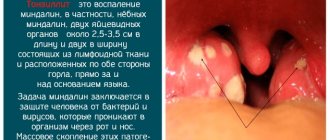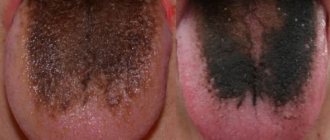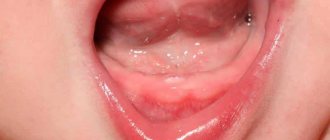general characteristics
From time to time, an unpleasant taste occurs in healthy people.
It can be caused by the accumulation of food particles due to insufficient oral hygiene, or the consumption of foods with a bright, rich taste. In most cases, the symptom is caused by pathological causes. A bitter taste is felt in the mouth mainly in the morning, immediately after waking up. Unpleasant sensations bother a person for several hours and do not disappear after rinsing the mouth with water. Bitterness or a feeling of sourness are accompanied by heartburn and a sore throat. In this case, the oral mucosa dries out, the saliva is viscous, and is released in smaller quantities. Sometimes patients complain of a strong chemical or metallic taste that lasts throughout the day. If symptoms appear with a certain frequency or constantly, you need to visit a specialist.
At the reception, a mature woman complains of the taste of chalk in her mouth. In the morning, there is no discomfort in the mouth. Around 1 p.m. every day, a burning sensation appears on the tip of the tongue, like a tingling sensation with needles. This painful, painful sensation intensifies from lunch to evening, when the sensation of the taste of chalk is added. The jaws clench, the chewing muscles tense, the teeth make movements as if grinding something.
These are the complaints that bothered the patient at the time of treatment. And the story of their appearance is as follows.
In March of last year, the patient was fired from her job, completely unexpectedly and in a humiliating manner. This fact in her life is worth telling in more detail.
For more than ten years she worked in a branch of one large organization known throughout the country. The branch was “dying” when, let’s call her Evgenia Filimonovna, came to work at this branch. Very soon she established herself as an excellent worker - proactive, creative, responsible, disciplined, and decent. Very soon she was promoted to department head. The department she headed brought the entire branch into the category of the best branches in the region. For success in her work she was repeatedly rewarded with prizes, certificates, and thanks. She was awarded the “Best in Profession” distinction. Only two people from the region received such badges. Colleagues from the head Moscow office set Evgenia Filimonovna as an example to everyone else at all-Russian conference calls.
Her immediate supervisor of the branch was a mediocre, or even “below average” person; his intellectual limitations did not allow him to delve into the content of the work process. Twice he failed to pass professional certification, but some of his other abilities allowed him to remain in the leadership chair. Evgenia Filimonovna actually managed the employees for him, motivated them to high performance, solved all production problems that her manager had to solve, and raised all performance indicators to the best in the region. He repeatedly told her “thank you!” and added: “What would I do without you?!”
In March, at about 11 o’clock, “two representatives from the region” arrived. Evgenia Filimonovna intuitively felt that “they had come for my Soul”; she was in an anxious state for two hours. Around lunchtime, at about 1 p.m., her bosses called her in and, in the presence of those who arrived, told her that she had been fired. No justification for dismissal was provided. They forced me to sign an order that included the wording “dismissed by agreement of the parties.” As soon as she put her signature, her work computer was “ruined”, so it became impossible to remove her personal photographs and her author’s work from it. On the same day they paid her off, confiscated the keys to the office and turned their backs on her.
The patient spent three weeks in neurotic depression - “in tears and snot”, did not leave the house, did not communicate with anyone. After a month and a half, when the symptoms of depression decreased, psychosomatic disorders appeared - an extremely unpleasant taste of acid in the mouth. Evgenia Filimonovna turned to the dentist. He diagnosed galvanosis and suggested removing the metal crowns. Some of the crowns were removed in June, but the taste of acid persisted, so in August all the dental crowns were removed.
After the crowns were removed, a chalky taste appeared in the mouth and a burning sensation, tingling on the tip of the tongue. I went back to the dentist, who just shrugged his shoulders. That’s when Evgenia Filimonovna turned to me.
After the first session, the taste of chalk in the mouth disappeared, and after the second session of psychotherapy, the tingling, burning of the tip of the tongue and clenching of the teeth disappeared. She arrived for the third session without complaints. By the way, my mood became normal, the obsessive feelings of the psychotrauma I experienced went away, and the ability to smile, joke, and talk about abstract topics appeared.
Now, let's analyze psychosomatic disorders.
In preschool childhood (and in school, too), little Zhenya was raised by her grandmother because her mother “arranged her personal life,” and simply, she abandoned her daughter to her mother and chased after men. Evgenia Filimonovna was etched in her memory by one episode from her childhood connected with her mother.
“I was 4-4.5 years old. Mom arrived home. I missed her very much and was very happy about her arrival. It was the first of May. Mom was in a very beautiful dress, she was going to go to a demonstration. They inflated me with balloons, and I was looking forward to going with my mother to the demonstration - she in a beautiful dress, and me with balloons. Mom didn’t take me and went alone. I ran after her and cried, shouting to her to take me with her. My grandmother caught up with me and forcibly returned me home... Throughout my childhood, I felt useless and abandoned. I was drawn to my mother, but she always pushed me away.
I have known the taste of chalk since childhood. Previously, walls were whitened not with lime, but with chalk. I often licked the walls, picked off pieces of chalk and ate, for which I was often punished. I guess I didn’t have enough calcium, that’s why I was drawn to chalk. I also ate raw potatoes, their taste is somewhat similar to chalk. As for the taste of acid, I don’t know where it comes from. Only all my life I haven’t eaten sour apples, I don’t eat cherry plums or raspberries at all. I can’t stand sour things.”
If Evgenia Filimonovna cannot tolerate the feeling of acid in her mouth, it means that there was an episode in her life, probably in early preschool age, in which she experienced severe suffering and the taste of sour at the same time. Perhaps she was crying, experiencing severe mental suffering, and at that moment she ate something sour. According to the mechanism of a conditioned reflex, the connection between suffering and sour taste was closed. Her mind couldn't remember anything like that. But this does not mean that such an event did not happen in her life. Just like that, out of the blue, a dislike for sour taste will not develop for life.
After the neurotic depression ended, her suffering did not disappear, but moved to the psychosomatic level. Therefore, sensations of acid in the mouth appeared, according to the mechanism of a conditioned reflex formed in distant childhood. This time she was deprived of her job with her self-esteem humiliated. Probably, in childhood, there was an episode when she was also deprived of something dear to her and at the same time her self was humiliated. According to the mechanism of a conditioned reflex, she had a feeling of acid in her mouth.
Dental crowns have absolutely nothing to do with this feeling. She wore them before and everything was fine. If Evgenia Filimonovna had contacted me immediately after her dismissal, there would have been no neurotic depression, no psychosomatic disorders, and all the dental crowns would have been preserved.
When the dentist confidently told the patient that the taste of acid would no longer bother her, another unconscious conditioned reflex turned on, but the triggering moment was identical to the first one. The taste of chalk is like a reminder of one’s uselessness and abandonment. Then her mother abandoned her, and now she was kicked out of work “like a mangy dog,” despite all her previous merits.
Clenched teeth and a burning sensation on the tip of the tongue are an unconscious strong desire to express everything to your boss and at the same time a strong prohibition on yourself from realizing this desire.
The time of onset of the symptom - lunch, coincides with the time of severe psychotrauma experienced, again, according to the mechanism of a conditioned reflex. I.M. was right. Sechenov, who proved that “all acts of conscious and unconscious human life are reflexes in their origin.”
From March to December the woman suffered. Two sessions of psychotherapy and torment “like a cow licked it with its tongue.” Psychosomatics is the Soul’s cry for help. The soul screams with body language, turning to someone who can help eliminate mental suffering. And who can eliminate them? only a psychotherapist. So such patients with psychosomatic disorders go from one doctor to another, in a vicious circle, until someone shows the way to a psychotherapist. There are years of suffering. They treat, operate, irradiate...
I asked Evgenia Filimonovna about how her mother arranged her personal life. Has she found herself a husband? In response I heard: “I found a husband, but it’s impossible to say that her personal life was a success...”
I expected this answer. If Evgenia Filimonovna’s mother did not run after men, but raised her daughter with kindness and love, then the Lord would definitely give her the one she had been looking for all her life. A real man, with whom a woman feels happy, will accept and raise the child of his beloved woman as his own. Such a man must be earned. If you don’t deserve it, then no matter how you look for it, you won’t find it. And if you deserve it, then completely unexpectedly for you, miraculously, he will appear in your life. Just remember the plot of the film “Moscow Doesn’t Believe in Tears.”
Good luck and health to you, and happy new year 2015!
PS When the article was posted on the site and the patient read it, she remembered the reason for the sour feeling in her mouth. The unconscious made her aware. When she was 7 years old, on New Year's Eve, all her classmates were preparing for a masquerade ball. The girls said that at the ball they would be a snowflake, a fairy, and a fox. And little Zhenya really wanted to be a princess or a queen, or even a snowflake. Then the new dad came (mom got married this year) with a briefcase and took out a pig costume for Zhenya. “I cried bitterly and said that I would not wear this suit.” But the mother insisted, and instead of the princess, Zhenya appeared in front of her classmates in a pig costume. She felt humiliated and insulted, she saw the mocking ridicule of her peers, pointing fingers at her, and the whispering of the girls. She doesn’t remember how the matinee went. I remember two moments: the terrible feeling of being crushed, humiliated in the Soul and the sour taste in the mouth from the apples and tangerines received as a gift. She ate fruit and tasted sour in this disgusting pig costume. Feelings of humiliation and insult to her self-respect combined with the taste of sour in her mouth, the conditioned reflex to sour closed. That is why, despite the past decades, she did not eat anything sour, so as not to unconsciously revive those extremely difficult memories.
When Evgenia Filimonovna experienced a humiliating, insulting dismissal, her unconscious revived those childhood memories for her through the mechanism of a conditioned reflex. As a result of such dismissal, she, the best in her profession, felt again in a pig costume, at which everyone laughs and mocks. “You are not a queen, and not even a princess, but an ordinary pig!” - that was what was in her Soul on an unconscious level when she lay on the sofa facing the wall, day after day, after her dismissal. Having turned on the feeling of sourness in the mouth, the unconscious forced Evgenia Filimonovna to seek help, first from a dentist, then from a psychotherapist. The goal has been achieved, she has found someone who can alleviate her suffering.
Here is another illustration of how our Unconscious works. It never forgets anything. This Consciousness does not remember, but the Unconscious remembers everything down to the smallest detail throughout life.
Causes of taste in mouth
Causes of blood taste in mouth
This symptom occurs when you accidentally bite your cheek or tongue until it bleeds. The characteristic taste in the mouth, repeated several times a week, is due to pathological reasons. The main diseases that cause a taste of blood in the mouth are:
- Dental diseases
: gingivitis, stomatitis, periodontitis. - ENT pathology
: sinusitis, chronic atrophic rhinitis. - Damage to the gastrointestinal tract
: erosive esophagitis and gastritis, peptic ulcer, dilation of the esophageal veins. - Cardiovascular disorders
: hypertension, angina, vasculitis. - Rare causes
: tuberculosis, lung cancer, bronchial asthma.
Causes of bitter taste in mouth
Bitterness is most often felt in the morning, but sometimes the symptom bothers the patient during the day. The bitter taste is accompanied by nausea, loss of appetite, sometimes vomiting with bile, and a specific unpleasant smell of rotten breath. A bitter taste in the mouth can be caused by the following reasons:
- Age-related mucosal atrophy in the elderly
. - Pregnancy
. - Bad habits
: smoking, alcohol abuse. - Liver pathologies
: autoimmune, viral or toxic hepatitis, cirrhosis, fatty degeneration. - Damage to the biliary tract
: cholecystitis and cholangitis, bile duct dyskinesia, cholelithiasis. - Gastrointestinal diseases
: functional dyspepsia, chronic gastritis, duodenitis. - Neurological disorders
: consequences of traumatic brain injury, residual manifestations of stroke, Alzheimer's disease. - Iatrogenic conditions
: placement of fillings, dental prosthetics. - Complications of pharmacotherapy
: treatment with chemotherapy drugs, antihistamines, antibiotics.
Causes of metallic taste in mouth
An unpleasant sensation is more often observed after consuming untreated tap water that passes through poor quality pipes covered with rust. The taste of iron also appears when cooking or storing food in aluminum cookware. Possible pathological causes of a metallic taste in the mouth:
- Anemia
: iron deficiency, B12 deficiency. - Foreign bodies
: piercings on the tongue or lips, low-quality metal dentures. - Hormonal changes
: pregnancy, menopause. - Chemical poisoning
: mercury, lead, copper, arsenic. - Exposure to radiation
. - Diseases of the urinary system
: chronic glomerulonephritis, interstitial nephritis, renal failure. - Gastrointestinal diseases
: esophageal erosion, bleeding gastric ulcer, esophageal varicose veins. - Complications of pharmacotherapy
: taking antiprotozoal, antacid antihypertensive drugs.
Causes of sweet taste in mouth
A constant taste of sweetness is observed in people who abuse confectionery and chocolate. If the symptom is not associated with food intake, unsweetened foods predominate in the diet, this indicates serious problems. The main reasons for which a sweet taste appears in the mouth:
- Diabetes
. - Pregnancy, gestational diabetes
. - Dental diseases
: caries, periodontitis, stomatitis. - Diseases of the digestive system
: chronic pancreatitis, GERD, hyperacid gastritis. - Exposure to pathogenic microorganisms
: Pseudomonas aeruginosa, staphylococci and streptococci. - Neurological disorders
: damage to the facial nerve, chronic stress. - Pesticide poisoning
.
Causes of acetone taste in the mouth
A sharp chemical taste is often the result of changes in metabolic processes and the accumulation of ketone bodies. This symptom does not occur normally and always indicates serious disturbances in the functioning of the body. The unpleasant smell and taste of acetone in the mouth is caused by the following reasons:
- Following a low-carbohydrate diet
. - Endocrine diseases
: diabetes mellitus and its complication - ketoacidotic coma, thyroid dysfunction. - Kidney damage
: glomerulonephritis, acute and chronic renal failure, necronephrosis. - Liver pathology
: fibrosis and cirrhosis, Wilson-Konovalov disease, neoplasms.
Other symptoms
The presence of other symptoms along with the taste of fish in the mouth is due to the underlying disease.
You should know! When dehydrated, a person develops dry mouth and pale skin, general health worsens, and lethargy appears.
The accumulation of mucus in the nasopharynx develops due to infection, so all signs of inflammation develop - rhinitis, cough, general malaise.
Poor oral hygiene can lead not only to a fishy taste in the mouth, but also to other dental ailments - caries, gum inflammation , etc.
Infectious and inflammatory processes in the oral cavity cause , in addition to a fishy taste, a number of associated symptoms in the mouth:
- development of bleeding gums;
- tooth pain;
- plaque on the teeth and on the surface of the tongue;
- if there is a fistula in the gum, then pus is released from there;
- sore throat and coughing;
- expectoration of foul-smelling sputum, which often forms with chronic tonsillitis.
Diagnostics
If an atypical taste is occasionally or constantly felt in the mouth, consultation with a gastroenterologist is required. The symptom is caused by various reasons, therefore, before laboratory and instrumental examination, you should carefully collect anamnesis and accompanying complaints. The greatest diagnostic value is:
- Blood tests
. A standard blood chemistry test reveals the accumulation of ammonia and ketone bodies, which often cause an unpleasant taste in the mouth. Clinical analysis can detect a decrease in hemoglobin, changes in the size and shape of red blood cells, which is characteristic of anemia. If necessary, toxicological analysis is carried out. - Hormonal profile
. If patients complain of a sweetish sensation in the mouth, fasting sugar levels are measured. The results of an oral glucose tolerance test are indicative. To clarify the form of diabetes, the concentration of insulin and C-peptide is taken into account. If glucose levels are normal, it is recommended to determine the level of thyroid hormones. - ENT examination
. During the study, the condition of the mouth, throat, and nasal passages is examined. Frequent findings are signs of chronic inflammation, purulent or whitish deposits on the mucous membrane. Bloody crusts are sometimes found in the nose. If carious teeth or bleeding gums are detected, a person is referred to a dentist. - Endoscopy
. The causes of unusual taste sensations, which are combined with abdominal pain and painful heartburn, are diagnosed using FGDS. During endoscopy, inflammatory and destructive processes in the gastric mucosa, insufficiency of the cardiac sphincter with the flow of acidic contents into the esophagus are visualized. - X-ray imaging
. To exclude ENT causes of a persistent unpleasant taste in the mouth, an x-ray of the paranasal sinuses is performed. Excretory urography is indicated for patients with swelling, lower back pain and other signs of kidney damage. To study the condition of the intestines, a barium passage x-ray is prescribed. - Additional methods
. In women, levels of sex hormones must be examined; in young patients, the level of human chorionic gonadotropin is additionally assessed to confirm or exclude pregnancy. If lung cancer is suspected, especially in men with a long history of smoking, bronchoscopy with collection of material for cytomorphological analysis is required.
If you have an unpleasant taste in your mouth, it is important to maintain oral hygiene
Chalky taste in women
A woman has such taste for a reason. Frequent and partial reasons for the appearance of taste: chalk, iron, herring in girls are changes in hormonal levels. Hormonal levels change during PMS and pregnancy.
Doctors explain this: In the first trimester, women eat excessive amounts of food. Without proper nutrition, they disrupt the functioning of the gastrointestinal tract. In the second trimester, appetite decreases significantly, and nutrition returns to normal. But the consequences remain. Heartburn, burning, excess weight. It is heartburn that contributes to the appearance of an unpleasant taste in the mouth, belching and odor.
The body's functioning processes are restored with the help of a harmonious diet and vitamin intake. They are prescribed by a general practitioner or your treating gynecologist.
Treatment
Help before diagnosis
Many patients feel relief after rinsing their mouth with water and a small amount of lemon juice or a weak solution of soda. It is important to maintain oral hygiene: brush your teeth thoroughly 2 times a day, rinse your mouth with water after each meal, and use dental floss if necessary. In order not to suffer from bitterness in the morning, you should refrain from fatty foods and smoked foods at dinner.
Pregnant women are advised to eat often, in small portions, so as not to overload the gastrointestinal tract. After eating, you should not take a horizontal position or engage in physical labor. If an unpleasant taste in the mouth is accompanied by dyspeptic disorders, pain or a progressive deterioration of the general condition, it is important to consult a doctor in time to determine why the taste occurs in the mouth.
Conservative therapy
A specific taste occurs in many diseases, so only the main directions of therapy can be identified, and the selection of an individual set of therapeutic measures is carried out by a specialist. When caries is detected, treatment by a dentist is indicated: usually, after the elimination of chronic foci of infection, the unpleasant taste disappears. Most often used in therapeutic regimens:
- Antiseptics
. Regular rinsing of the oral cavity with a solution of chlorhexidine and its analogues ensures moisturizing and cleansing of the mucous membrane, and prevents the proliferation of pathogenic microorganisms. For stomatitis with pain, solutions of local anesthetics are used. - Antacids
. If the symptom is due to hyperacid conditions, modern non-absorbable drugs that quickly reduce acidity are recommended. A course of treatment with antisecretory agents is often required to achieve a lasting effect and healing of mucosal defects. - Choleretic drugs
. In case of biliary pathology, the composition of bile is improved and its release into the duodenum is stimulated, due to which the bitterness disappears. The drugs can be combined with hepatoprotectors to protect the liver from the effects of bile acids. - Antidotes
. Heavy metal poisoning is an indication for the prescription of specific complexones that bind and remove toxic substances from the blood. To speed up detoxification, large volumes of crystalloid solutions are administered intravenously.
What to do and who to contact?
A therapist will help you deal with this problem.
How he will do it:
- Recognizes patient complaints and symptoms. Ask questions about nutrition, sleep patterns, and oral hygiene. Will conduct an inspection.
- Prescribe the necessary blood and urine tests. Thus, it will find out which vitamins are missing, and whether there are any diseases that contribute to unpleasant taste sensations.
- Based on test results and symptoms, he will prescribe medications. Will tell you detailed steps and solutions for bad taste in mouth.
If the test results show that there are infectious or viral diseases in the body, the doctor is obliged to redirect you to a specialized medical specialist.
Remember! If there is any deviation of your immune system from the norm, you should consult a doctor. Only they can prescribe the correct and necessary treatment to solve problems. And our article will help you find out the possible reasons and not panic until a specialist’s verdict.
Add AN to your sources so as not to miss important events - Yandex News
Become a member of the CLAN and every Tuesday you will receive the latest issue of “Arguments of the Week” with a discount of more than 70%, along with exclusive materials not included in the newspaper. Get premium access to a library of the most interesting and popular books, as well as an archive of more than 700 published issues for FREE. In addition, you will have the opportunity to benefit from free legal advice from our experts for a whole year.
- Enter your email address, then select any convenient payment method for your annual subscription
- Scan the QR. In the Sberbank Online application that opens, enter the annual subscription cost (490 rubles). Then send the confirmation code by email
Or
Drug therapy
Diagnosis of gastrointestinal diseases
Treatment of bitterness in the mouth and nausea, or rather the causes of their occurrence, is a complex measure, which invariably consists of:
- Diagnosis of the disease, determination of its pathogenesis and symptoms exhibited by the patient.
- Relief of unpleasant symptoms.
- The main course of treatment aimed at combating the cause of bitterness and nausea.
- Maintaining the obtained result.
- Prevention of gastrointestinal diseases.
Perhaps all of the described stages can be independently organized by the patient. The most difficult step, most likely, will be the first step, which is diagnosis. Its difficulty lies in the fact that in no case should mistakes be made during diagnosis.
Therefore, if, with the help of medical reference books with a detailed description of each gastrointestinal ailment, you were unable to determine the pathology specifically in your case, it is better not to spend a week on home therapy, but to go for treatment together with a gastroenterologist.
The remaining stages of therapy are relatively simple, since their organization directly depends on the patient’s existing disease. For general information purposes, we present a general list of drugs used to get rid of the symptoms being considered today:
- To relieve unpleasant symptoms (nausea, abdominal pain, bitter taste, etc.), various drugs are used, among the most used of which are: antiemetics (Domperidone), sorbents (Smecta, activated carbon) and antispasmodics (No-Shpa).
- To combat the cause of the pathology - antiemetic medications (for general gastrointestinal disorders), anti-inflammatory drugs (for inflammation in the stomach), antibacterial agents (for bacterial lesions) and so on.
Maintaining the results obtained and preventing them are usually carried out without the use of medications. Often it is enough to introduce a healthy lifestyle and a diet that excludes the intake of foods that are difficult for the gastrointestinal tract.
In case of a long-term stable condition after therapy, it is permissible to abandon the diet, diversifying the food with all products (naturally, without fanaticism).










